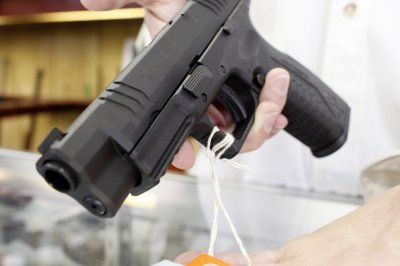
Sept. 29 (UPI) — The Trump administration on Monday rescinded a Biden-era firearms export rule that prohibited the transfer of civilian weaponry to individuals in 36 countries deemed high-risk of falling into the hands of criminals or terrorists.
The Department of Commerce’s Bureau of Industry and Security rescinded the interim final rule, arguing it imposed “onerous” export controls on weapons, throttling U.S. gunmakers from competing in overseas markets at a cost of hundreds of millions of dollars a year in exports.
“BIS strongly rejects the Biden administration’s war on the Second Amendment and law-abiding firearms users,” Jeffrey Kessler, under secretary of Commerce for Industry and Security, said in a statement.
“With today’s rule, BIS is restoring common sense to export controls and doing right by America’s proud firearms industry, while also continuing to protect national security.”
The Biden administration released the interim final rule in April 30, 2024, to restrict private transfers of firearms out of the United States.
It aimed to reduce so-called straw purchases where one person legally buys the weapon for someone restricted by the United States from owning it.
It did this by barring the sale of weapons to individuals in 36 countries the Department of State has designated a “substantial risk” that lawful firearms exports to non-governmental entities will be diverted or misused, according to a report to Congress on Biden-era restrictions on firearms sales.
The countries are those blacklisted in the State Department’s Country Reports on Human Rights Practices and the Presidential Determination on Major Drug Transit or Major Illicit Drug Producing Countries.
Countries on those lists include Afghanistan, Myanmar, China, El Salvador, Nicaragua, Venezuela, Jamaica and others.
The rule also reduced export license limits to one to two years instead of the previous four to five and required potential exporters to include purchase orders and passport identification from the intended recipient to show they are the actual person who is interested in and allowed to receive the firearm.
Civilian weapons and ammunition affected by the rule included most pistols, rifles, and non-long barrel shotguns.
In rescinding the rule, the Bureau of Industry and Security argued the presumption of denial to 36 countries ceded the overseas markets in those nations to foreign firearms manufactures, the export license requirements were a bureaucratic hurdle about optics, not national security.
“The firearm industry is tremendously grateful to the Trump administration and BIS officials for their actions to restore American competitiveness in firearm manufacturing and exports to foreign countries,” Lawrence Keane, NSSF senior vice president and general counsel, said in a statement.
“American firearm manufacturing is the worldwide leader and removing these restrictions will restore access to foreign markets while continuing to maintain adequate export controls to prevent illegal firearm trafficking.”
A report produced in October 2024 by the Government Accountability Office found that 73% of all weapons, mostly handguns, recovered in crimes by law enforcement in Caribbean nations, which account for six of the 10 highest murder rates in the world, had come from the United States, many coming from commercial sales.
Rep. Gregory Meeks, D-N.Y., ranking member of the House Foreign Affairs Committee, chastised the Trump administration for further weakening oversight of international arms transfers, saying these weapons will now more easily find their ways into “illicit hands.”
“Countries around the world, especially in Latin American and the Caribbean, have called on the U.S. to better control the export of American firearms, which all too often are exploited by gangs and criminal networks to destabilize communities and exacerbate civilian insecurity,” he said in a statement, while pointing to the GAO report.
“The administration’s reduction of oversight checks on such sales does nothing to strengthen national, regional or global security.”